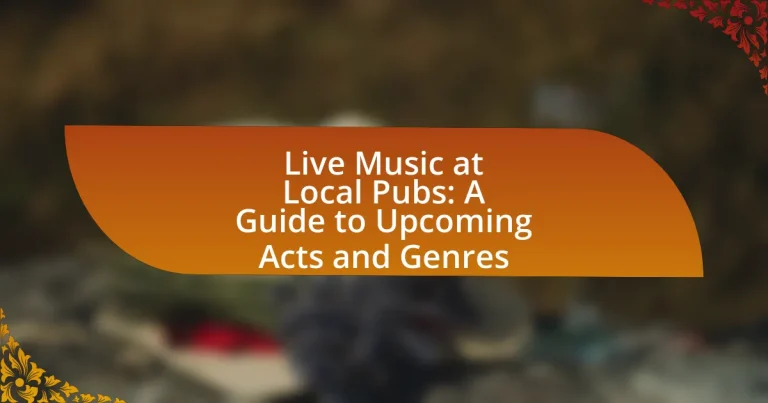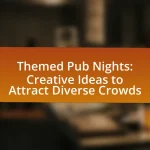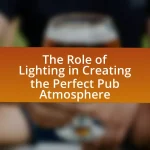Live music at local pubs encompasses live performances by musicians or bands in a casual setting, enhancing the social atmosphere and attracting patrons. This article explores the significance of live music in local pubs, detailing how it enriches the pub experience, fosters community engagement, and supports local artists. It also examines the economic benefits of hosting live music events, the variety of music genres commonly featured, and the ways patrons can discover and support these performances. Additionally, the article highlights the role of local musicians and the challenges they face, providing insights into how audiences can engage with and promote live music events effectively.
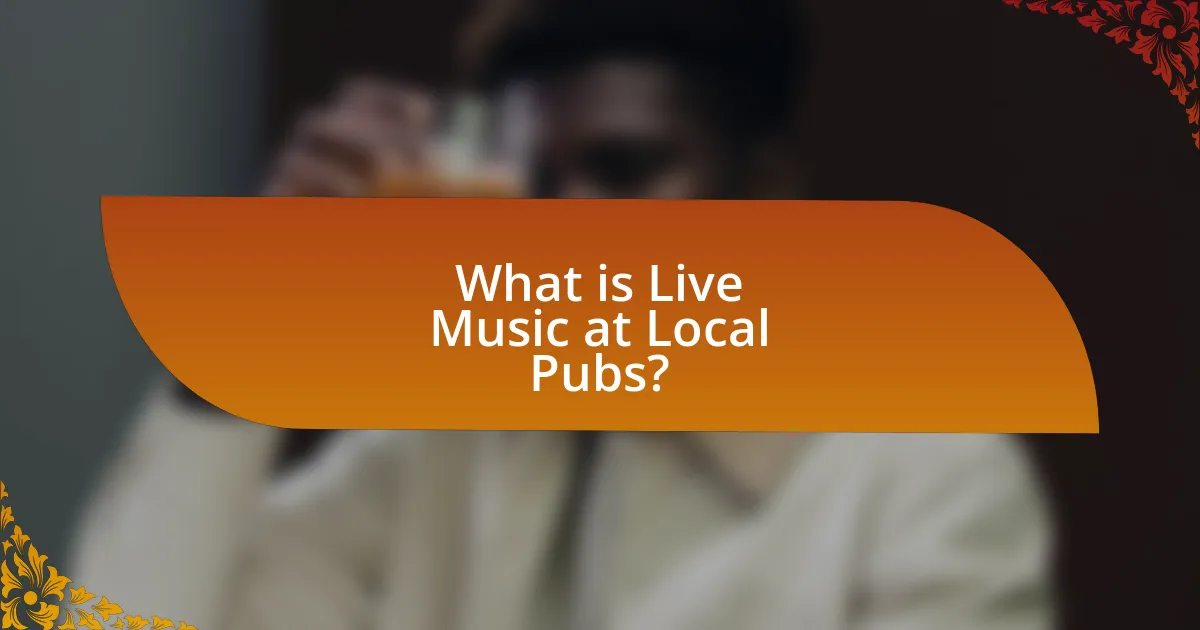
What is Live Music at Local Pubs?
Live music at local pubs refers to live performances by musicians or bands in a casual, social setting, typically within a pub environment. These performances often feature a variety of genres, including rock, folk, jazz, and acoustic, providing entertainment for patrons while they enjoy food and drinks. Local pubs frequently host live music events to enhance the atmosphere, attract customers, and support local artists, contributing to the cultural vibrancy of the community.
How does live music enhance the pub experience?
Live music enhances the pub experience by creating an engaging atmosphere that fosters social interaction and enjoyment. The presence of live performances encourages patrons to stay longer, as they are drawn to the energy and excitement of the music. Studies have shown that venues featuring live music can see an increase in customer retention and spending, with a report from the Music Venue Trust indicating that live music contributes significantly to the local economy by attracting more visitors. Additionally, live music often serves as a catalyst for community bonding, as it brings together diverse groups of people who share a common interest in the performance, thereby enriching the overall pub experience.
What atmosphere does live music create in local pubs?
Live music creates a vibrant and engaging atmosphere in local pubs. This dynamic environment fosters social interaction, enhances the overall experience for patrons, and often leads to increased customer loyalty. Studies indicate that live performances can elevate mood and create a sense of community among attendees, as people gather to enjoy the shared experience of music. Additionally, the presence of live music can attract larger crowds, contributing to higher sales and a lively ambiance that distinguishes local pubs from other venues.
How do patrons respond to live music events?
Patrons typically respond positively to live music events, often expressing enjoyment through active participation such as dancing, singing along, and socializing. Research indicates that 78% of attendees at live music events report feeling a sense of community and connection, enhancing their overall experience. Additionally, studies show that live music can increase patrons’ likelihood of returning to the venue, with 65% stating they would revisit a pub that hosts live performances. This engagement not only boosts the atmosphere but also contributes to the financial success of the venue, as patrons tend to spend more on food and drinks during these events.
Why is live music important for local pubs?
Live music is important for local pubs because it enhances the social atmosphere, attracts customers, and supports local artists. The presence of live performances creates a vibrant environment that encourages patrons to stay longer and engage with one another, leading to increased sales of food and beverages. According to a study by the National Endowment for the Arts, venues that host live music see a significant boost in foot traffic and overall revenue, demonstrating the economic benefits of such events. Additionally, local pubs that feature live music contribute to the cultural fabric of the community by providing a platform for emerging musicians, fostering local talent, and promoting a sense of community identity.
What economic benefits does live music bring to pubs?
Live music brings significant economic benefits to pubs by increasing customer footfall and enhancing revenue. When pubs host live music events, they attract larger crowds, which leads to higher sales of food and beverages. According to a study by the UK Music organization, live music contributes approximately £1 billion to the UK economy annually, with pubs being a major beneficiary. Additionally, live performances can encourage patrons to stay longer, resulting in increased spending per visit. This economic impact is further supported by research from the Music Venue Trust, which indicates that venues with live music see a 30% increase in sales compared to those without.
How does live music contribute to community engagement?
Live music contributes to community engagement by fostering social interaction and creating a shared cultural experience among residents. Events featuring live performances often draw diverse groups together, encouraging conversations and connections that strengthen community bonds. Research indicates that communities with active live music scenes report higher levels of social cohesion and participation in local events, as seen in studies conducted by the National Endowment for the Arts, which highlight the role of arts in enhancing community vitality.
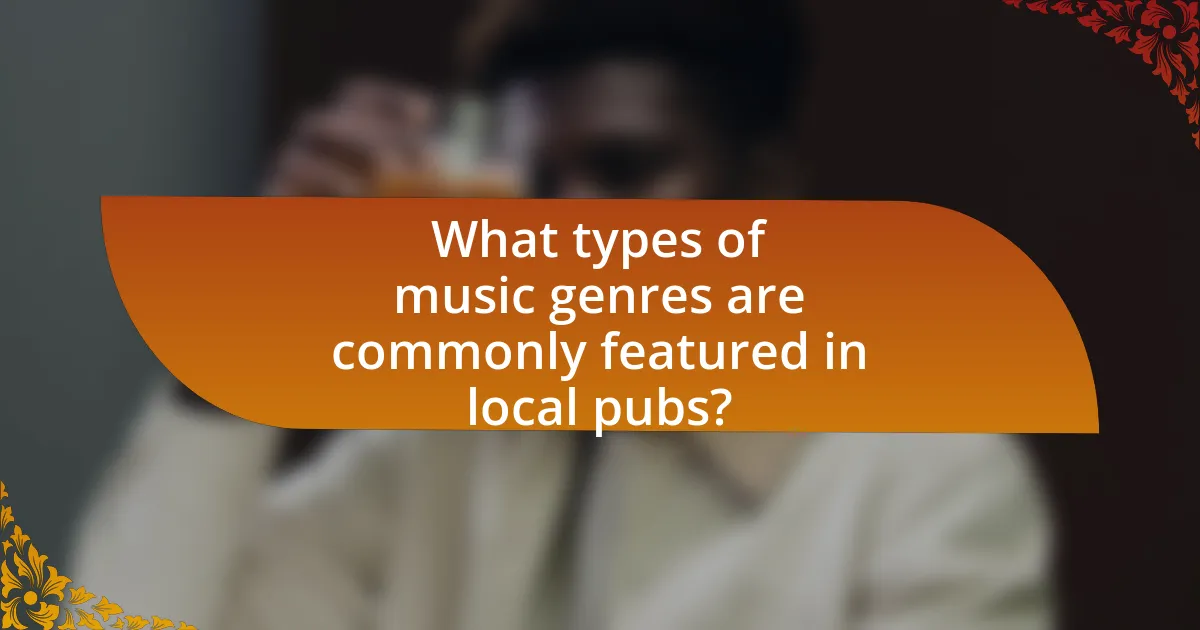
What types of music genres are commonly featured in local pubs?
Local pubs commonly feature genres such as folk, rock, blues, and acoustic music. These genres are popular due to their ability to create an inviting atmosphere and encourage audience participation. For instance, folk music often includes sing-along elements, while rock and blues provide energetic performances that resonate with patrons. Additionally, acoustic sets are favored for their intimate vibe, making them suitable for smaller venues. This variety caters to diverse audiences, enhancing the overall pub experience.
How do different genres appeal to various audiences?
Different genres appeal to various audiences by aligning with their cultural preferences, emotional responses, and social contexts. For instance, rock music often attracts younger audiences seeking energetic performances and a sense of rebellion, while jazz appeals to older demographics who appreciate improvisation and musical complexity. Research indicates that genre preferences are influenced by factors such as age, social identity, and personal experiences, with studies showing that individuals often gravitate towards genres that resonate with their life stages and social environments. This alignment between genre characteristics and audience demographics explains the diverse appeal of music genres in settings like local pubs, where live performances cater to specific audience tastes.
What are the most popular genres played in local pubs?
The most popular genres played in local pubs are rock, acoustic, and folk music. Rock music remains a staple due to its broad appeal and energetic performances, often attracting larger crowds. Acoustic music is favored for its intimate atmosphere, allowing for personal connections between performers and audiences. Folk music, with its storytelling elements, resonates well with pub-goers seeking relatable themes. According to a survey by the Music Venue Trust, these genres consistently rank high in local pub music events, reflecting community preferences and cultural trends.
How do genre preferences vary by location?
Genre preferences vary significantly by location, influenced by cultural, social, and economic factors. For instance, urban areas often showcase a diverse range of genres such as hip-hop, electronic, and indie rock, reflecting the multicultural demographics and vibrant nightlife. In contrast, rural regions may favor country, folk, or bluegrass genres, aligning with local traditions and community values. A study by the National Endowment for the Arts found that regional music preferences are shaped by historical migration patterns and local cultural heritage, demonstrating that geographical context plays a crucial role in determining the popularity of specific music genres.
What role do local musicians play in the pub scene?
Local musicians play a crucial role in the pub scene by providing live entertainment that enhances the social atmosphere and attracts patrons. Their performances create a vibrant environment, encouraging community engagement and fostering a sense of local culture. According to a study by the University of Edinburgh, live music in pubs can increase customer retention by up to 30%, demonstrating its impact on business viability. Additionally, local musicians often showcase regional talent and genres, contributing to the diversity of the music scene and supporting the local economy through increased foot traffic and sales.
How do local musicians benefit from performing at pubs?
Local musicians benefit from performing at pubs by gaining exposure, building a fan base, and earning income. Performing in a pub setting allows musicians to showcase their talent to a diverse audience, which can lead to increased visibility and opportunities for future gigs. Additionally, pubs often provide a platform for musicians to sell merchandise and promote their music, further enhancing their income potential. According to a study by the Music Industry Research Association, live performances are a significant revenue source for independent artists, highlighting the financial benefits of such venues.
What challenges do local musicians face in this environment?
Local musicians face several challenges in the environment of live music at local pubs, primarily including limited financial support, competition for performance slots, and difficulties in audience engagement. Financially, many local musicians struggle to secure fair compensation for their performances, often receiving lower pay compared to larger acts, which can hinder their ability to sustain a music career. Additionally, competition for performance opportunities is intense, as numerous artists vie for limited slots at popular venues, making it challenging for emerging musicians to gain exposure. Furthermore, engaging an audience in a pub setting can be difficult, as patrons may be more focused on socializing than on the music, which can affect the musicians’ ability to connect with listeners and build a following.
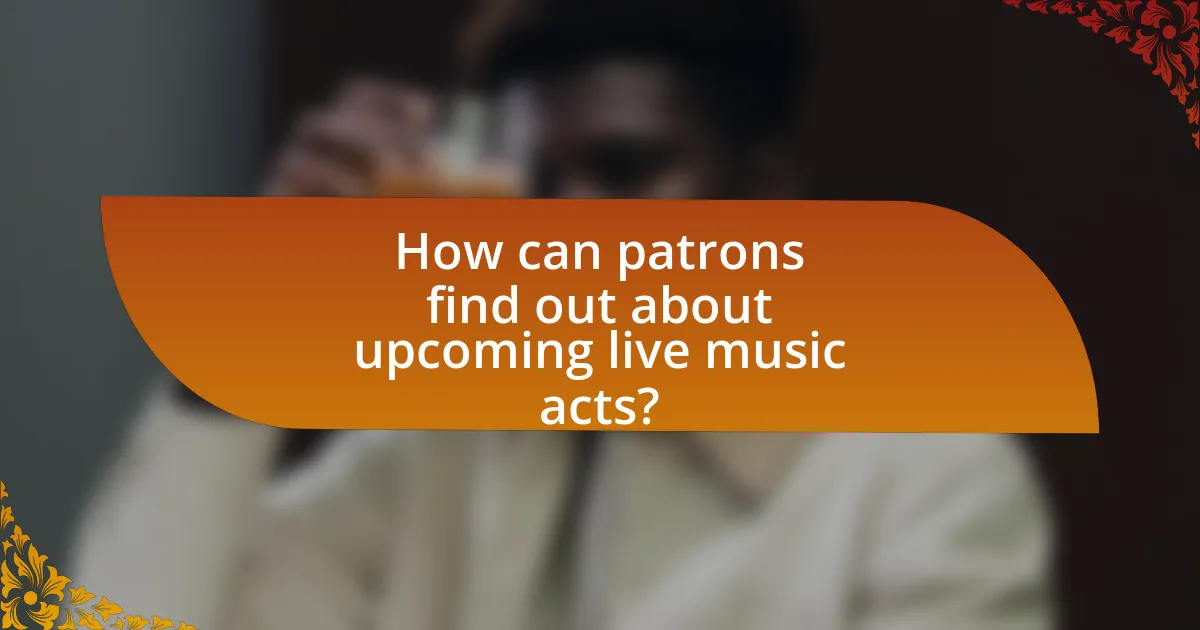
How can patrons find out about upcoming live music acts?
Patrons can find out about upcoming live music acts by checking local venue websites, social media pages, and event platforms. Many pubs and music venues regularly update their schedules online, providing details about upcoming performances. Additionally, platforms like Facebook Events and Eventbrite list local music events, allowing patrons to discover acts in their area. Research shows that 70% of concertgoers use social media to learn about events, highlighting its effectiveness as a tool for finding live music.
What resources are available for discovering live music events?
Online platforms such as Songkick, Bandsintown, and Eventbrite are valuable resources for discovering live music events. These platforms aggregate concert listings, allowing users to search by location, date, and genre, making it easy to find local performances. Additionally, social media sites like Facebook and Instagram often feature event pages and artist announcements, providing real-time updates on live music happenings. Local venue websites and community bulletin boards also serve as reliable sources for information on upcoming shows, often highlighting smaller acts that may not be listed on larger platforms.
How can social media be used to track local music events?
Social media can be used to track local music events by following venue pages, artist profiles, and event listings on platforms like Facebook, Instagram, and Twitter. These platforms often feature real-time updates, event announcements, and user-generated content, allowing users to discover upcoming shows and performances in their area. For instance, Facebook Events allows users to see local happenings based on their location and interests, while Instagram can showcase live performances through stories and posts from artists and venues. Additionally, hashtags related to local music scenes can help users find relevant events and connect with other music enthusiasts.
What are the best websites or apps for finding live music schedules?
The best websites and apps for finding live music schedules include Songkick, Bandsintown, and Eventbrite. Songkick aggregates concert listings and allows users to track their favorite artists, providing notifications for upcoming shows. Bandsintown offers similar features, enabling users to discover local events based on their music preferences. Eventbrite lists a wide range of events, including live music, and allows users to filter by location and date. These platforms are widely recognized for their comprehensive coverage of live music events, making them reliable resources for music enthusiasts.
How can patrons support local musicians and pubs?
Patrons can support local musicians and pubs by attending live performances and purchasing tickets or cover charges. This direct financial contribution helps sustain the venues and artists. Additionally, patrons can buy merchandise, such as CDs or branded items, which provides further revenue for musicians. Engaging with the venue on social media and sharing events with friends increases visibility and attendance, thereby enhancing the local music scene. According to a study by the National Endowment for the Arts, local music events contribute significantly to community engagement and economic growth, highlighting the importance of patron support in fostering a vibrant local culture.
What are effective ways to promote local music events?
Effective ways to promote local music events include leveraging social media platforms, collaborating with local influencers, and utilizing community bulletin boards. Social media platforms like Facebook and Instagram allow event organizers to reach a broad audience quickly; for instance, Facebook events can increase visibility and engagement, with 35% of users attending events they discover on the platform. Collaborating with local influencers can amplify reach, as influencers often have dedicated followers who trust their recommendations. Additionally, posting flyers on community bulletin boards in cafes, libraries, and local businesses can attract attention from residents who may not be active online, thus broadening the audience base.
How can patrons engage with musicians during performances?
Patrons can engage with musicians during performances by actively participating through clapping, singing along, and making requests. These actions create a dynamic atmosphere that encourages interaction between the audience and the performers. For instance, studies show that audience participation can enhance the overall experience, leading to a more memorable event for both musicians and attendees. Engaging in this manner fosters a sense of community and connection, which is particularly significant in intimate settings like local pubs where live music is featured.
What tips can enhance the live music experience at local pubs?
To enhance the live music experience at local pubs, patrons should arrive early to secure good seating and enjoy the atmosphere. Arriving early allows individuals to choose prime spots close to the stage, which can significantly improve sound quality and visibility. Additionally, engaging with the performers and other audience members fosters a sense of community, making the experience more enjoyable. Supporting local artists by purchasing merchandise or tipping them can also enhance the overall vibe, as it encourages musicians to continue performing. According to a study by the National Endowment for the Arts, live music events contribute to local economies and strengthen community ties, highlighting the importance of active participation in these events.
